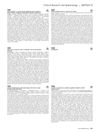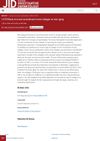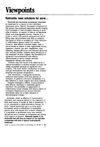 31 citations,
November 2014 in “Investigative Ophthalmology & Visual Science”
31 citations,
November 2014 in “Investigative Ophthalmology & Visual Science” A natural steroid in the body may protect against eye damage in glaucoma.
 January 2016 in “Springer eBooks”
January 2016 in “Springer eBooks” Understanding drug interactions, side effects, and patient-specific factors is crucial for effective dermatological care.
 61 citations,
January 2019 in “American Journal of Clinical Dermatology”
61 citations,
January 2019 in “American Journal of Clinical Dermatology” The cause of Frontal Fibrosing Alopecia is unclear, diagnosis involves clinical evaluation and various treatments exist, but their effectiveness is uncertain.
 37 citations,
October 2006 in “Steroids”
37 citations,
October 2006 in “Steroids” New sulfur-containing steroid analogs show promise for more targeted medical treatments.
 44 citations,
April 2008 in “The Journal of Clinical Endocrinology & Metabolism”
44 citations,
April 2008 in “The Journal of Clinical Endocrinology & Metabolism” Women with PCOS have similar levels of certain proteins compared to women without PCOS, and these proteins don't independently cause PCOS.
18 citations,
January 1988 in “Acta oncologica” Retinol palmitate may reduce cancer relapses in early-stage lung cancer patients.
 4 citations,
July 2017 in “Archivum Immunologiae et Therapiae Experimentalis”
4 citations,
July 2017 in “Archivum Immunologiae et Therapiae Experimentalis” Retinol may affect immune responses in people with frequent skin boils.
 2 citations,
July 1982 in “British Journal of Dermatology”
2 citations,
July 1982 in “British Journal of Dermatology” Retinol acetate can reduce the harmful effects of the drug benoxaprofen on white blood cells.
 1 citations,
May 2013 in “Journal of the Egyptian Women's Dermatologic Society (Print)”
1 citations,
May 2013 in “Journal of the Egyptian Women's Dermatologic Society (Print)” Women with idiopathic hirsutism and PCOS have higher RBP4 levels, and PCOS is linked to greater insulin resistance; weight management may help both conditions.
 September 2019 in “Journal of Investigative Dermatology”
September 2019 in “Journal of Investigative Dermatology” Retinol significantly reduces neck wrinkles.
January 2022 in “Menoufia Medical Journal /Menoufia Medical Journal” Higher levels of retinol-binding protein 4 are found in people with alopecia areata, but these levels don't relate to how severe the condition is.
 September 2016 in “Journal of the Egyptian Women's Dermatologic Society (Print)”
September 2016 in “Journal of the Egyptian Women's Dermatologic Society (Print)” Higher RBP4 levels found in people with two types of hair loss.
 2 citations,
December 2018 in “Journal of cosmetic dermatology”
2 citations,
December 2018 in “Journal of cosmetic dermatology” Higher CRBP1 levels are linked to more severe alopecia areata.
5 citations,
October 2021 in “Clinical, cosmetic and investigational dermatology” Japanese patients with alopecia areata often have a higher BMI and consume more vitamin C, fruit, and retinol, which may affect their condition's development or severity.
39 citations,
January 1991 in “Oncology” High-dose vitamin A was safe and well-tolerated in a lung cancer treatment study.
34 citations,
January 2022 in “Molecules/Molecules online/Molecules annual” Natural ingredients in cosmeceuticals are beneficial for skin and hair health with few side effects.
 19 citations,
March 2007 in “Journal of diabetes science and technology”
19 citations,
March 2007 in “Journal of diabetes science and technology” Rosiglitazone may be better than metformin for insulin resistance in PCOS, but more research is needed on certain biomarkers.
 18 citations,
January 2016 in “Elsevier eBooks”
18 citations,
January 2016 in “Elsevier eBooks” Nanotechnology improves cosmetics' effectiveness and safety.
18 citations,
October 1978 in “The journal of investigative dermatology/Journal of investigative dermatology” Excess vitamin A causes lasting gland changes in mouse hair follicles.
10 citations,
February 2014 in “Fitoterapia” Pomiferin may improve skin and hair by increasing important protein production.
 4 citations,
April 2018 in “Journal of Investigative Dermatology”
4 citations,
April 2018 in “Journal of Investigative Dermatology” Hydroxypinacolone retinoate is a potent anti-aging ingredient for skin that is more effective and less irritating than other forms of retinoids.
1 citations,
April 2015 in “The FASEB journal” UVB exposure increases skin proteins for retinoic acid synthesis and shifts their location, possibly affecting skin repair.

Higher levels of β-carotene and vitamin E may help prevent certain types of hair loss.
 April 2023 in “Journal of Investigative Dermatology”
April 2023 in “Journal of Investigative Dermatology” The new recombinant human collagen can help slow skin aging and repair skin, while also controlling inflammation.

Cosmetics can help with mild skin problems and daily care but must be used carefully to avoid skin irritation.
Scalp med(R) effectively and safely improves hair count and thickness in men with androgenetic alopecia.
The enzyme Dgat1 is essential for healthy hair and skin by controlling retinoid levels.
 September 1988 in “Inpharma (Balgowlah)”
September 1988 in “Inpharma (Balgowlah)” Retinoids are effective for acne but can cause serious side effects.
258 citations,
July 2005 in “Journal of lipid research” DGAT1 enzyme helps make diacylglycerols, waxes, and retinyl esters.
4 citations,
September 2003 in “PubMed” Low protein diets cause severe health issues in rats, but high protein diets can reverse these effects.


















